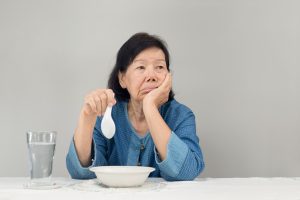
Learn the facts about preventing malnutrition in seniors.
Many of us remember gathering at Grandma’s house for Sunday dinners. However, because so many families now live far away from their elderly family members, and with numerous needs pulling us in multiple directions, it is difficult to keep up with this tradition – and it could be just one of the issues adding to a recent dramatic rise in senior malnutrition.
In fact, as much as 25% of all people over age 65 in the U.S. are malnourished, creating critical health concerns. Many seniors who live alone simply don’t feel up to preparing nutritious meals for themselves. Others are experiencing medication side effects, poverty, cognitive issues, feelings of anxiety, grief, depression, and many other causes of poor dietary habits.
No matter what reason, senior loved ones who are malnourished are at a higher risk for compromised immune systems, longer and more challenging hospitalizations and readmissions, as well as earlier mortality. And uncovering senior malnutrition is not as simple as noticing that your loved one has lost weight, either; people who appear to be at a healthy weight or even overweight may also be undernourished.
How Can You Detect and Prevent Malnutrition in Seniors?
One main factor in revealing and preventing senior malnutrition is in the hands of the medical community. Older loved ones should be evaluated for nutritional issues by their primary care physician and have a dietary plan recommended and implemented. When in the hospital, medical staff must also monitor for potential nutritional deficiencies, and include their findings and a recommended plan of action in discharge paperwork to be reviewed with both caregivers and the older adult’s doctor.
Family members can also help make sure the nutritional needs of their senior loved ones are met, and help uncover the root cause if problems are observed. For instance, if financial hardships are keeping the person from adhering to a balanced diet, he/she may be eligible for the Supplemental Nutrition Assistance Program (SNAP). Currently, as many as three out of every five seniors who qualify for the program are not making use of its benefits.
Make sure to take note of warning signs that your older loved one may not be following a healthy diet, and to discuss any concerns with his or her doctor. And, call on Advanced Home Health Care, providers of home health care services in Burlington, Fort Madison, Keokuk, and the nearby areas, for assistance in developing better dietary habits for the senior.
We can plan and prepare delicious meals in accordance with recommended dietary plans, shop for groceries and make sure there are plenty of healthy food options available at all times, and provide friendly companionship that makes mealtimes more enjoyable. Reach out to us at 800.791.7785 or contact us online for more information about how we can help your family.

